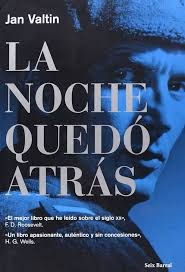
Original language: English
Original title: Out of the night
Year of publication: 1940-1941
Translation: Not stated
Valuation: Essential
Notes: Richard Julius Hermann Krebs, alias Jan Valtin: The night was left behind. How is it possible that a work like this is practically unknown, and has been out of print in our country for a long time? Nothing since Seix Barral published it many years ago, in an edition and translation that we cannot describe as anything other than clearly improvable.
The life of Krebs – Valtin is not that of a narrator, nor that of a novelist, nor that of an academic: it is a life of film, risk, suspense, espionage and counterespionage; It is dedication to a cause that practically abducts everything else (family, children, home). Valtin was devoted to the German Communist Party and the Communist International in interwar Europe. If you like the history of the first half of the 20th century, if you are attracted by the politics of the time and knowing the specific ins and outs behind each visible action – those that historians often explain in aerial vision – don’t wait. Because Krebs was the author of several works, but in reality he was only the author of one, which is the story of his life.
Born in Mainz, the son of a Spartacist marine inspector there when Rosa Luxemburg (“he who does not move, does not feel the chains”) Krebs had a wandering childhood due to his father’s profession. But if a city associated with his adolescence and youth can be cited, it is Hamburg, where he lives among docks, workers and revolts, in a country severely defeated after Versailles, whose famous Constitution is plagued by unemployment, poverty and the extreme forces of the moment. -communist party and national socialist party- that surprisingly do not hesitate to join forces to put an end to the moderate options, waiting for a future duel between two that never happened… at least between Germans and without trenches. Krebs insists: the communist error in identifying the socialists as the enemy to defeat, and the consequent underestimation of the potential of the Nazi party, paved Hitler’s path to power.
In the difficult context of the 1920s, Valtin adheres to communism, a new religion that announces its soon advent, transcends borders and aims to end injustice in the world forever. But childbirth, necessarily, must be painful. And so he becomes a soldier within the Comintern hierarchy, an activist who thrives in the marine section. As an apostle of a new faith, he preaches the closeness of a reality that Moscow sponsors and protects. He recruits followers, distributes multilingual leaflets produced in clandestine printing presses around the world, conspires in international clubs that are really centers of party operations, organizes sabotage and strikes on ships and in ports, perfects his training in Leningrad and travels and propagates tirelessly. the good news in each country, obeying like a soldier and executing each command with the faith and ardor of a convert. However, doubts appear from time to time. And the author himself goes so far as to affirm that “only the company of Jesus has more power over its members than the Comintern.”
The book shows in detail the functioning of the party and the organization of its activities, especially in Germany and the Nordic countries; respects names of real characters and, in other cases, seems to hide people under fictitious names, and perhaps introduces some of his own imagination. The most notable and surely the best described, Ernst Wollweber, would be the future Minister for State Security of the GDR and head of the Stasi. Through the pages of this fictionalized autobiography, second-rate characters parade, precisely those who execute the specific decisions (and here lies one of the attractions of the book, as I have anticipated): Grigori Dimitrov, Heinz Neumann, Richard Jensen, Peter Kraus, Hertha Jens . Heinrich Himmler and Herman Göring also appear, although fleetingly.
Germany, Denmark, Norway, Sweden, England and the United States are the scenes of Krebs’ action under multiple false identities, until his arrest by the Gestapo in his native country, at which point a second part of the novel begins, clearly differentiated from the first and – we are not going to deny it – stark and uncompromising (you can imagine the life of a Comintern spy, possessor of valuable information, in the hands of Hitler’s police). The camps, the prisons, the laws dictated by the Nazi party and the gradual expansion of the spectrum of groups subject to National Socialist persecution are portrayed without a single band-aid: the –then- hidden face of that “new Germany”, described as it was.
But Krebs regains his freedom, in a way and at a price that we will not reveal. Former prisoner of the Nazis, his disenchantment and doubts increase with Stalin’s growing power in a party in which – for reasons that we will not reveal – his position becomes uncomfortable. So he finally fled to the United States and published, between 1940 and 1941, the work we are reviewing, which automatically became a best seller in which, probably, he disguised at least some not-too-honorable actions from his biography. “I find it grotesque to still be alive,” the author declared. In view of the work, we are not surprised.
What is The night is left behind? Roosevelt seems to have described it as “the best book I have read about the 20th century.” There are various reactions or judgments that the work can provoke in the reader; some positive, such as faith in values, the fight for something you believe in, the hope for a better world; or negative, such as the prohibition of questioning guidelines or the radical drift within an organization with an iron structure, with the consequent loss of friendship, trust and camaraderie. But I think that, essentially, the novel is a harsh plea and a warning, right during the course of a world war, against the two extremes that devastated Europe – Hitler’s National Socialism and Stalin’s Communism – in almost 800 seamless pages, that catch you and won’t let you go. A book that, once started, you can’t stop reading.
Signed: Francisco Marin
Source: https://unlibroaldia.blogspot.com/2025/01/colaboracion-la-noche-quedo-atras-de.html


